
Getting a crypto exchange license in 2025 requires federal MSB registration, state-specific licenses like BitLicense, robust AML/KYC systems, and $500K+ in capital. Learn the steps, costs, and pitfalls to avoid shutdowns.
When you hear BitLicense, a state-level cryptocurrency licensing requirement issued by the New York State Department of Financial Services (DFS). It's not just a permit—it's a gatekeeper that reshaped the entire U.S. crypto landscape. Introduced in 2015, it was the first major regulatory framework in the U.S. that forced crypto companies to prove they could handle compliance, security, and consumer protection before serving even one New York resident. No other state had demanded this level of detail. And while it didn’t stop crypto, it made it harder for startups to survive without deep pockets.
BitLicense isn’t just about paperwork. It requires companies to have anti-money laundering systems, cybersecurity protocols, insurance policies, and even detailed records of every customer transaction. That’s why big names like Coinbase and Gemini spent millions to get approved, while smaller exchanges like Bitfinex and Kraken either left New York or built separate operations just for the state. New York State Department of Financial Services, the state agency that created and enforces the BitLicense didn’t just want to track crypto—it wanted to control it. And in doing so, it forced the whole industry to take regulation seriously.
What’s more, BitLicense didn’t just affect exchanges. It reached into wallets, custodians, and even crypto ATMs. If your service touched New York residents, you needed it. That’s why many companies simply blocked New York IP addresses instead of applying. The result? A fragmented U.S. market where some services were available in 49 states but not New York. DFS crypto rules, the specific requirements under the BitLicense framework became a model for other states—some copied them, others ignored them. But no one could pretend crypto regulation was optional anymore.
Today, BitLicense still exists. It’s not perfect. Critics say it’s too slow, too expensive, and too focused on old-school finance. Supporters argue it kept bad actors out and gave users real protection. Either way, it changed everything. If you’re trying to launch a crypto product in the U.S., you still have to ask: Will we need a BitLicense? And if not, how do we avoid running into it?
Below, you’ll find real stories from the frontlines of crypto regulation—how Nigeria built a thriving underground market after its own ban, how Thailand cracked down on foreign P2P platforms, and how Iran used mining to sidestep sanctions. These aren’t just isolated events. They’re all reactions to the same pressure: governments trying to control money that was never meant to be controlled. BitLicense didn’t kill crypto. But it forced the world to see it differently.

Getting a crypto exchange license in 2025 requires federal MSB registration, state-specific licenses like BitLicense, robust AML/KYC systems, and $500K+ in capital. Learn the steps, costs, and pitfalls to avoid shutdowns.